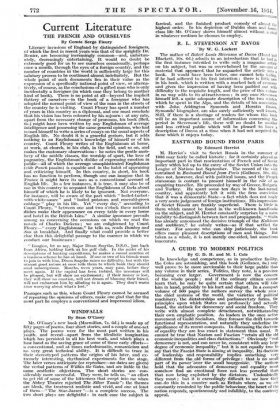Current Literature
THE FRENCH AND OURSELVES
By Comte Serge Fleury
Literary invasions of England by distinguished foreigners, of which the first in recent years was that of the sprightly Dr. Renier, are becoming' increasingly common—and, unfortun- ately, decreasingly entertaining. It would no doubt be extremely good for us to see ourselves occasionally, perhaps once a month, through the eyes of a foreign country, and the number of countries in the world is sufficiently large for this salutary process to be continued almost indefinitely. But the whole point of such documents lies in their value as the expression of a specifically national point of view, or alterna- tively, of course, as the conclusions of a gifted man who is only incidentally a foreigner (in which case they belong to another kind of book). There is no point at all—beyond the implicit flattery of ourselves—in the book of a foreigner who has adopted the normal point of view of the man in the streets of the country he is visiting. Count Fleury has spent a number of years in this country as a diplomat, and one must conclude that his vision has been coloured by his sojourn : at any rate, apart from the necessary change of pronouns, his book (Bell, 43s.) might have been written by any Englishman of average intelligence and possessing the same general opinions, who had roused himself to write a series of essays on the usual aspects of English life. No doubt it is a graceful gesture, but it adds nothing to an Englishman's knowledge of himself or of his country. Count Fleury writes of the Englishman at home, at work, at church, in his club, in the field, and so on, and makes the customary observations : he notes the gentle snob- bery of the middle classes, the worship of sport, the love of pageantry, the Englishman's dislike of expressing emotion in public—all of which the average unsophisticated Englishman (vide Punch passim) is capable and in the habit of appraising and criticizing himself. In this country, in short, his book has no function to perform, though one can imagine that in France it might have its uses as a conventional account of English life. In a few instances, it is true, it may also be of use in this country to acquaint the' Englishman of facts about himself of which he is likely to be ignorant. Not everyone, for instance, will be aware of the part which " boiled-turbot- with-white-sauce" and "boiled potatoes and emerald-green cabbage " play, in his life. Yetevery day," according„ to, Count Fleury, between one and two o'clock these national dishes make their appearance on every table in every home and hotel in the British Isles." A similar ignorance prevails among us concerning the occasions on which we read the novels of Charles Dickens; are enlightened by Count Fleury—" every Englishma," he tells us, reads Dombey and Son at breakfast. And finally what could provide a better clue than this delightful passage to the manner in which we conduct our businesses : " Imagine, let us say, Major Dixon Smythe, D.S.O., just back from Africa, holding forth at his golf club. In the- midst of his descriptions of hunting expeditions, he makes a casual mention of a business scheme he has on hand. If one or two of his friends want to join in with him, Dixon Smythe raises no difficulty, but with the utmost good nature at. once tells them to which bank they should send subscriptions. Months, 'wen years, may pass, before they meet again. If the capital has been trebled, the investors will be pleased, but will show no excitement ; if their money is lost, they will show no emotion, will not dream of blaming their friend, will not embarrass him by alluding to it again. They don't waste time worrying about what's lost."
Passages such as this, where Count Fleury cannot be accused of repeating the opinions of others, make one glad that for the most part he employs a conventional and impersonal idiom.






































 Previous page
Previous page